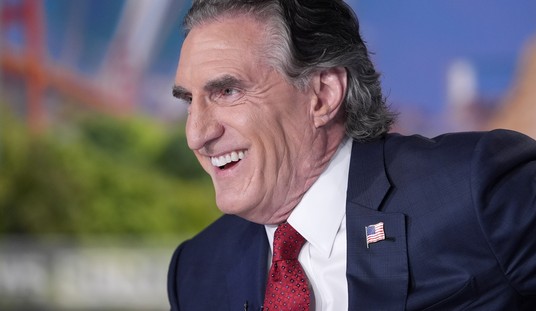And … so? Don’t blame Ilhan Omar for coming up with this idea for doubling down on her dismissive rhetoric about 9/11. That idea originated with Washington Post fact-checker Glenn Kessler, who argued that the criticism of Omar’s “some people did something” comment didn’t take into account its context. Omar was happy to use Kessler’s argument for the double-down, though:
“The people — and the people who knocked these buildings down will hear all of us soon!” President George W. Bush
Was Bush downplaying the terrorist attack?
What if he was a Muslim 🤔 https://t.co/XMazssoD49
— Ilhan Omar (@IlhanMN) April 12, 2019
Kessler wrote that Omar’s comments “reminded” him of Bush’s famous “bullhorn speech” three days after the 9/11 attacks. He provides more of her remarks, which don’t really appear to change much about how the emphasized remark was taken by others:
Omar argued that even a “good Muslim” may find roadblocks in the United States — and that that was the moment to stand up for one’s rights. “Once you are willing to stand up for yourself … then others will show up for you,” she said. She ticked off several examples, such as a Muslim being unable to find a place to pray in a hospital, even in “a country that was founded on religious liberty.”
“To me, I say, raise hell,” she said. “Make people uncomfortable.”
At this point, she uttered the words that raised controversy. We highlighted the passage in boldface.
“Here’s the truth. For far too long we have lived with the discomfort of being a second-class citizen and, frankly, I’m tired of it, and every single Muslim in this country should be tired of it. CAIR was founded after 9/11 because they recognized that some people did something and that all of us were starting to lose access to our civil liberties. So you can’t just say that today someone is looking at me strange and that I am trying to make myself look pleasant. You have to say that this person is looking at me strange, I am not comfortable with it, and I am going to talk to them and ask them why. Because that is the right you have.” …
When we listened to the whole speech, we were reminded of President George W. Bush’s phrasing in two famous moments after the Sept. 11 attacks.
Kessler’s second example from Bush, a speech given six days after the attack, hits close to the mark. In that speech to the Islamic Center in Washington DC, Bush stressed that American Muslims should not be treated as terrorists and should not fear to express their religion in the public square. Bush clearly understood the danger of backlash in those first few days and addressed it head-on; it’s a speech worth watching again, in fact.
In terms of context, though, the comparison between Omar and the Bush “bullhorn speech” suffers considerably. Here are Bush’s remarks at Ground Zero in full, perhaps his finest rhetorical moment in terms of capturing the mood of the nation:
“I can hear you! I can hear you! The rest of the world hears you! And the people — and the people who knocked these buildings down will hear all of us soon!”
Bush wasn’t arguing that some randos did something of lesser consequence than the reaction to it by using the word “people,” which by the way isn’t “somebody.” Most Americans still weren’t clear as to who the specific “people” were, although by September 14th, 2001 it was clear enough that it was a radical Islamist terror attack. In fact, the event was so significant that it brought the president of the United States to stand on the smoking wreckage it produced, embraced the rescue and recovery people working it, and pledge revenge on the “people” who committed the heinous act.
Clearly, Bush didn’t mean “people” to shrug off the attack to make the bigger issue the reaction by the actual victims of what was done. The two speeches couldn’t be more different, even if Omar’s larger point echoes the other Bush speech. Nor does the larger context of what Omar said make the comment less dismissive; in fact, it makes it more dismissive.
It’s amusing to see Omar embrace George Bush for his handling of 9/11 as a means of letting herself off the hook, though. “What if Bush were Muslim?” is an interesting counterfactual only to the perpetually aggrieved, which is exactly how Omar sounded in her speech. No one’s misconstruing what Omar said … and that’s why she’s unhappy about being criticized for it.
Update: I was remiss in not crediting Kessler with debunking the most factually challenged part of Omar’s speech — the claim that the Council for American Islamic Relations (CAIR) was founded in response to the response to the attack. Kessler accurately points out that it had been in operation for seven years, although it ramped up its operation after 9/11. Omar was either ignorant of that or lied about it, depending on how much grace you want to give her on the point.








Join the conversation as a VIP Member